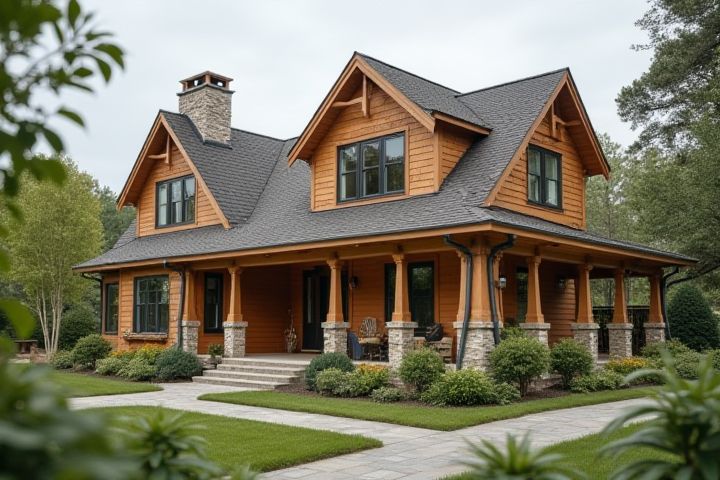
Before building a house, assess your budget, as it dictates your design choices, materials, and location. Evaluate the land, ensuring it meets zoning regulations and has access to essential utilities like water, electricity, and sewage. Consider hiring a qualified architect or builder to help navigate design, building codes, and other legal requirements. Think about your long-term lifestyle needs, including room layout, outdoor space, and future expansions. Lastly, research sustainable building practices to enhance energy efficiency and reduce environmental impact, benefiting both you and the planet.
What To Consider Before Building A House
Budget planning
Budget planning is crucial when building a house, as it determines the scope and quality of your project. Begin by estimating the total costs, including land purchase, construction expenses, permits, and additional fees such as utility connections and landscaping. It's essential to account for unexpected expenses, usually ranging from 10% to 15% of the total budget, to avoid financial strain during the building process. You should also research potential financing options, such as construction loans, to find a solution that aligns with your financial situation and goals.
Location selection
Choosing the right location for your house significantly impacts its value, accessibility, and lifestyle quality. Analyze local amenities such as schools, hospitals, and shopping centers, ideally within a 10-15 minute drive, to enhance daily convenience. Safety is paramount; research crime rates in the area, aiming for neighborhoods with lower than the national average. Finally, consider future development plans, as emerging infrastructure can drastically increase property value over time.
Permits and regulations
Before building a house, understanding local permits and regulations is crucial, as non-compliance can lead to costly delays and legal issues. Research zoning laws specific to your area, which dictate land use, building height, and density, often varied by neighborhood. You may also be required to obtain building permits, inspections, and approvals from local authorities, each with associated fees and timelines, potentially ranging from a few weeks to several months. Familiarizing yourself with environmental regulations, including flood zone designations and energy efficiency standards, will ensure that your construction project aligns with community safety and sustainability goals.
Architectural design
Before constructing a house, prioritize the architectural design to ensure functionality and aesthetic appeal. Consider the site's topography, climate, and orientation, which can influence energy efficiency and natural lighting. Your design should also incorporate local building codes and regulations, ensuring compliance with safety standards. Ultimately, create a floor plan that maximizes space utilization while reflecting your personal style and lifestyle needs.
Builder selection
Choosing the right builder is pivotal in your home construction journey, as it directly influences quality, timelines, and overall satisfaction. Research potential builders thoroughly, looking for those with a solid reputation, verified licenses, and extensive portfolios showcasing previous projects. Don't hesitate to check online reviews, ask for references, and inspect their completed homes for craftsmanship. Obtain detailed quotes from at least three builders, ensuring they include specifications, timelines, and warranty offers to help you make an informed decision.
Timeline estimation
Estimating a realistic timeline for building your house involves several key factors, including permits, construction phases, and potential weather-related delays. Generally, the entire process can take anywhere from six months to over a year, depending on the complexity of your design and local building regulations. It's essential to factor in at least 30 to 90 days for obtaining necessary permits, followed by the framing, plumbing, and electrical work that typically spans an additional 4 to 6 months. To minimize unforeseen setbacks, create a detailed project schedule and consider hiring a professional project manager to keep everything on track.
Sustainability options
Before building a house, consider incorporating sustainability options such as solar panels, which can reduce energy costs by up to 40%. Opt for energy-efficient appliances that can save approximately $500 annually on utility bills. Utilize sustainable materials like reclaimed wood and recycled steel to minimize your carbon footprint and support eco-friendly practices. Water-efficient fixtures, such as low-flow toilets and rainwater harvesting systems, can help conserve up to 50% more water compared to traditional options.
Insurance requirements
Before building a house, evaluate your insurance requirements to protect your investment. Typically, you'll need builders' risk insurance, which covers the property during construction for issues like fire, theft, or vandalism. Additionally, standard homeowners insurance will be necessary once the house is completed, with coverage options including liability, personal property, and structural damage due to natural disasters. Ensure that your policy limits align with the estimated value of your home to avoid underinsurance, often calculated as a percentage of the total construction cost.
Material quality
Evaluating material quality is crucial before building your house, as it directly impacts durability and long-term maintenance. Opt for materials that have high insulation values, such as energy-efficient windows, which can significantly reduce heating and cooling costs by up to 30%. Investigate the lifespan and resistance of various materials, like concrete versus wood, which can influence your home's resilience against natural elements over decades. Prioritize certified sustainable materials, as they not only enhance aesthetic appeal but also contribute to eco-friendly building practices, promoting a healthier living environment for you and future occupants.
Future resale value
When planning to build a house, consider the future resale value influenced by location, market trends, and demand dynamics. Research neighborhoods with strong appreciation rates, ideally between 5% to 10% annually, as they often attract potential buyers. Pay attention to features such as energy-efficient appliances and modern designs, which can increase your home's appeal and marketability. Lastly, consult real estate experts or online resources to gain insights into buyer preferences, ensuring your investment remains attractive in the competitive market.
